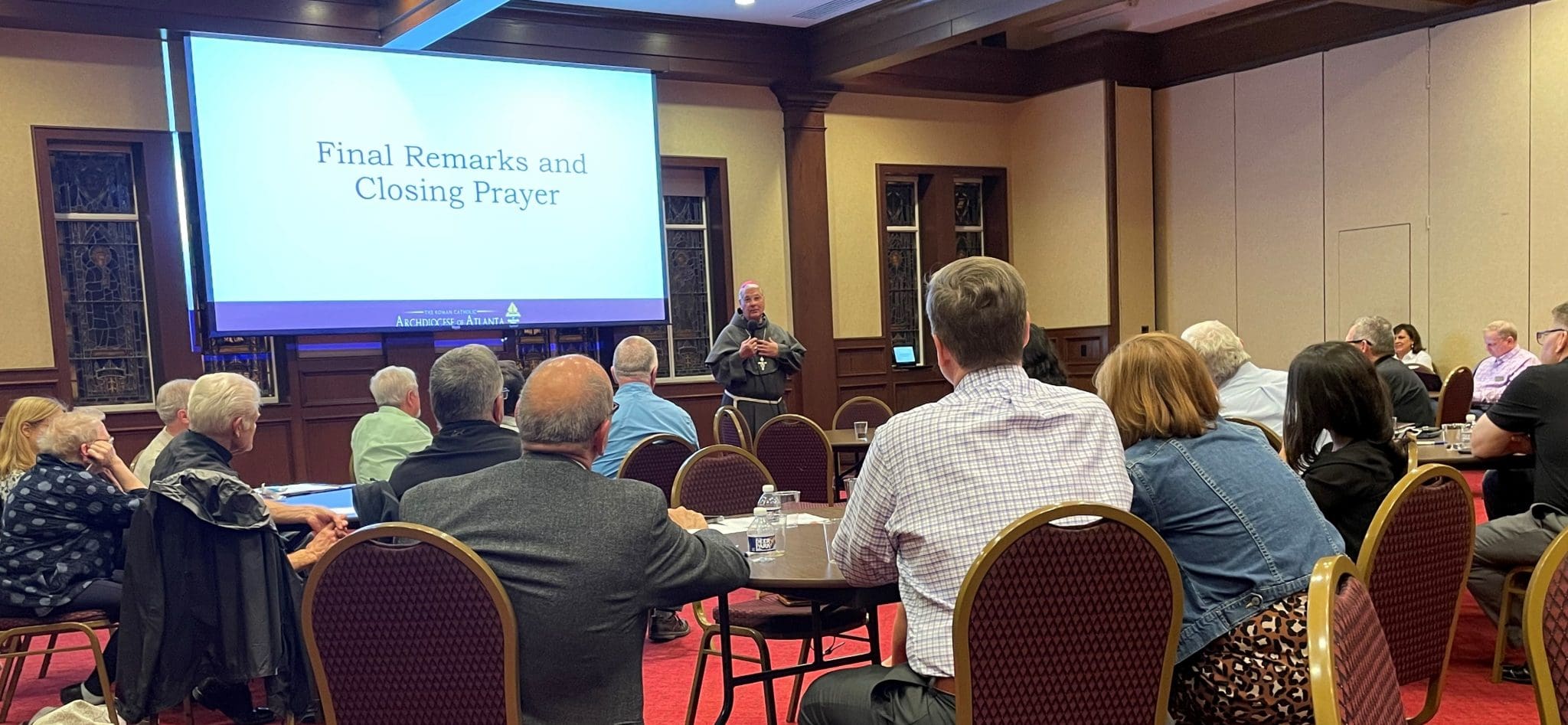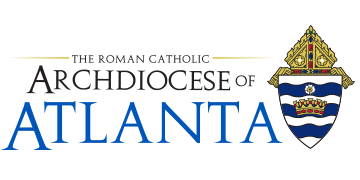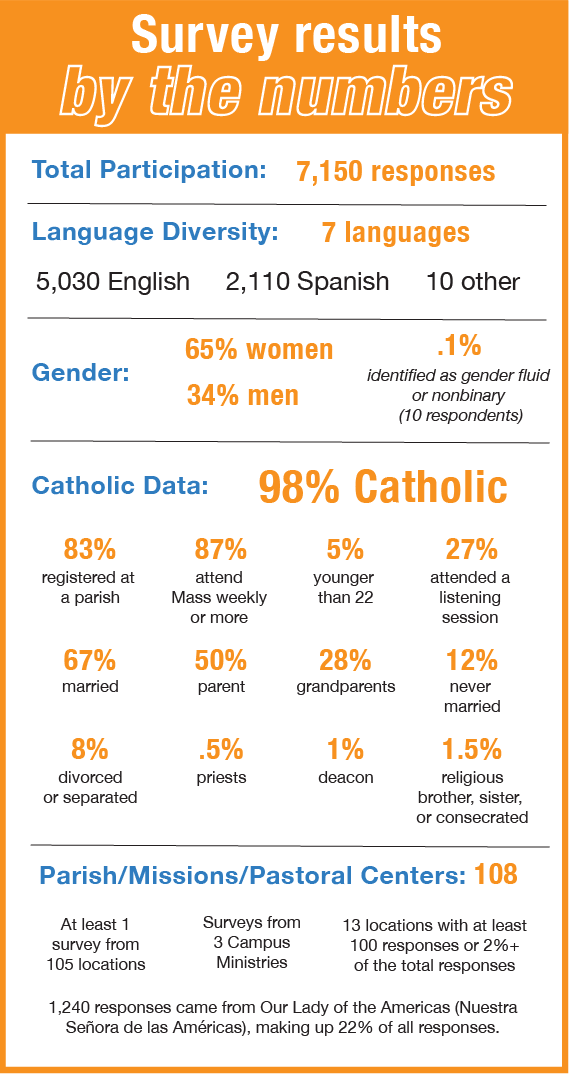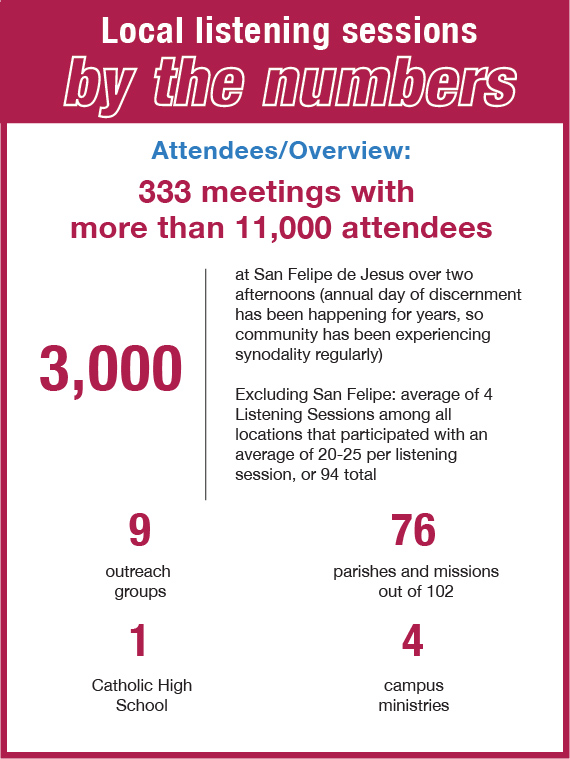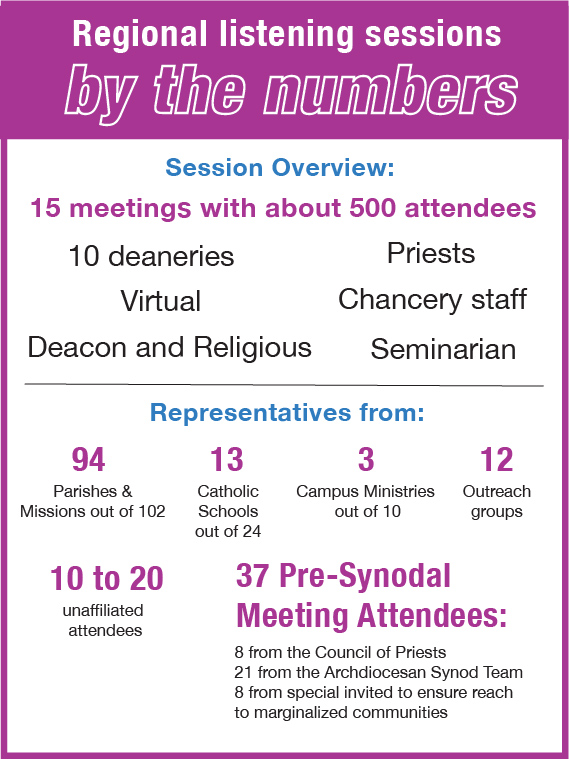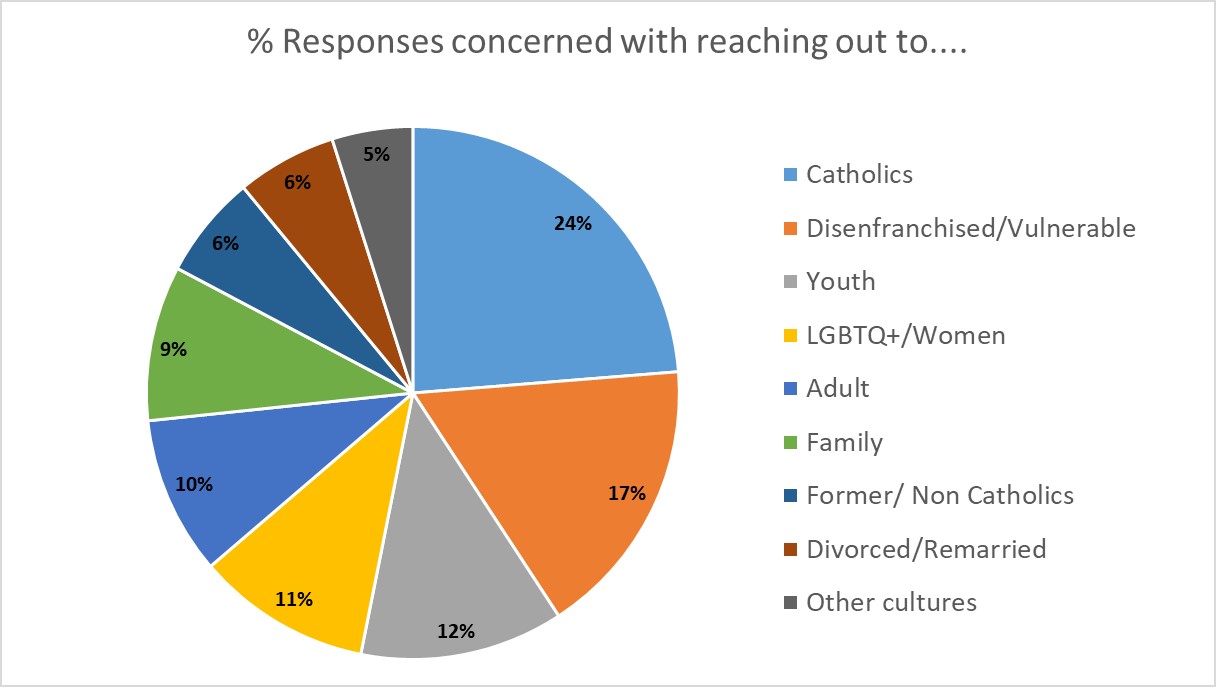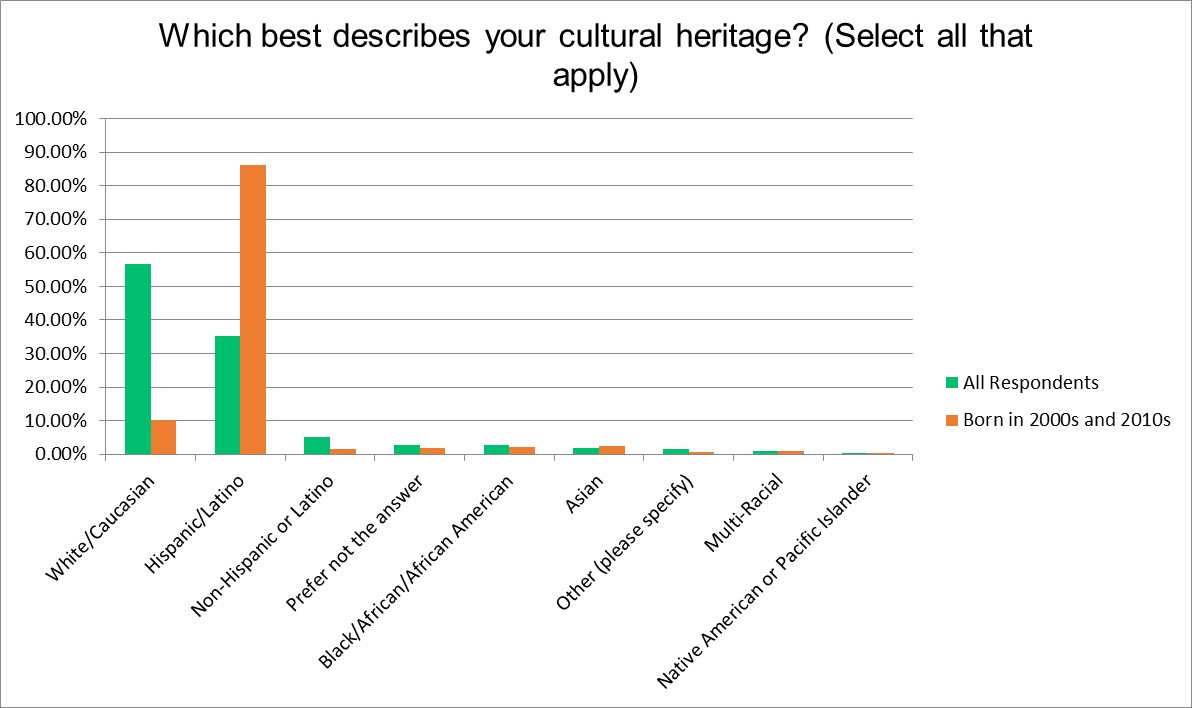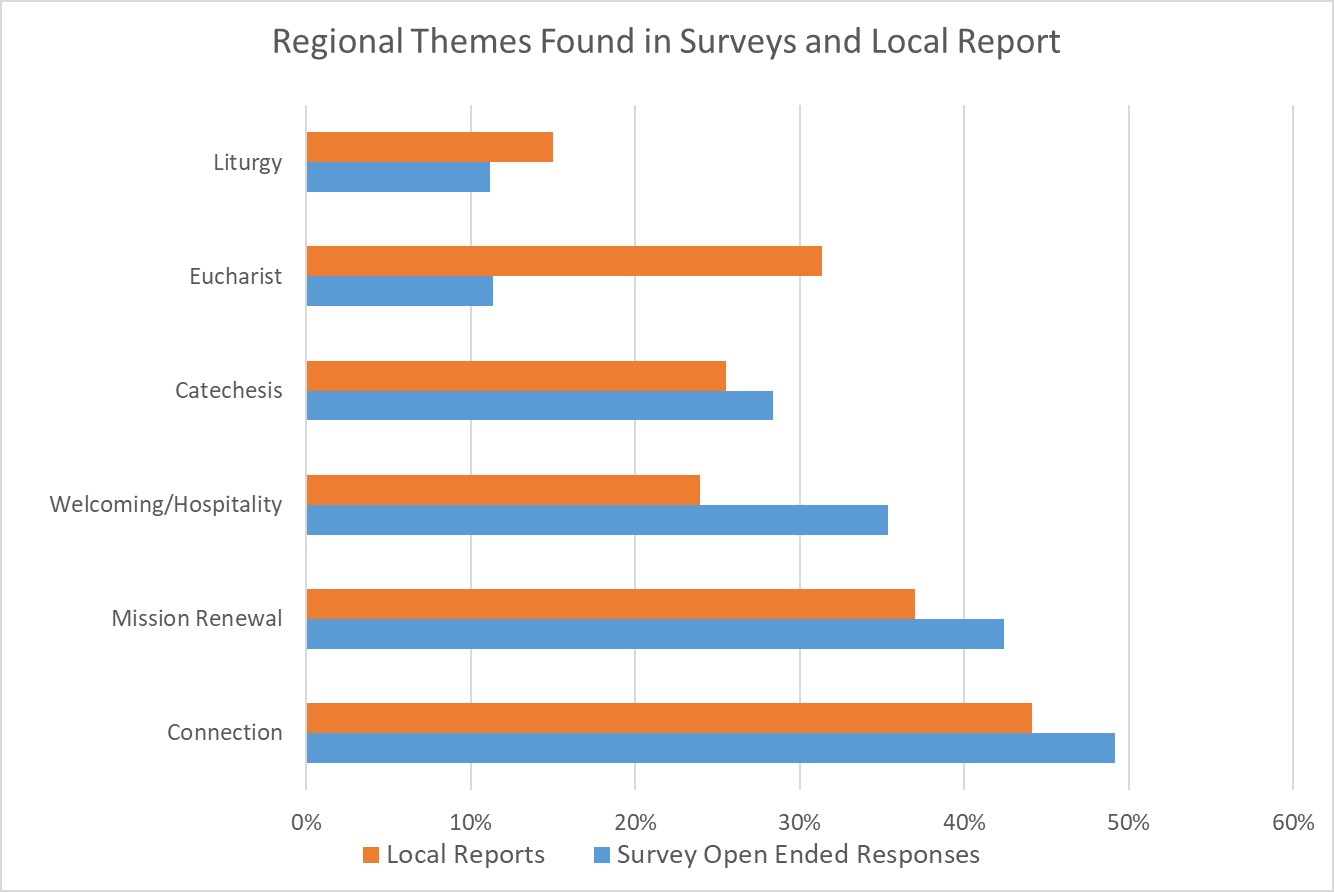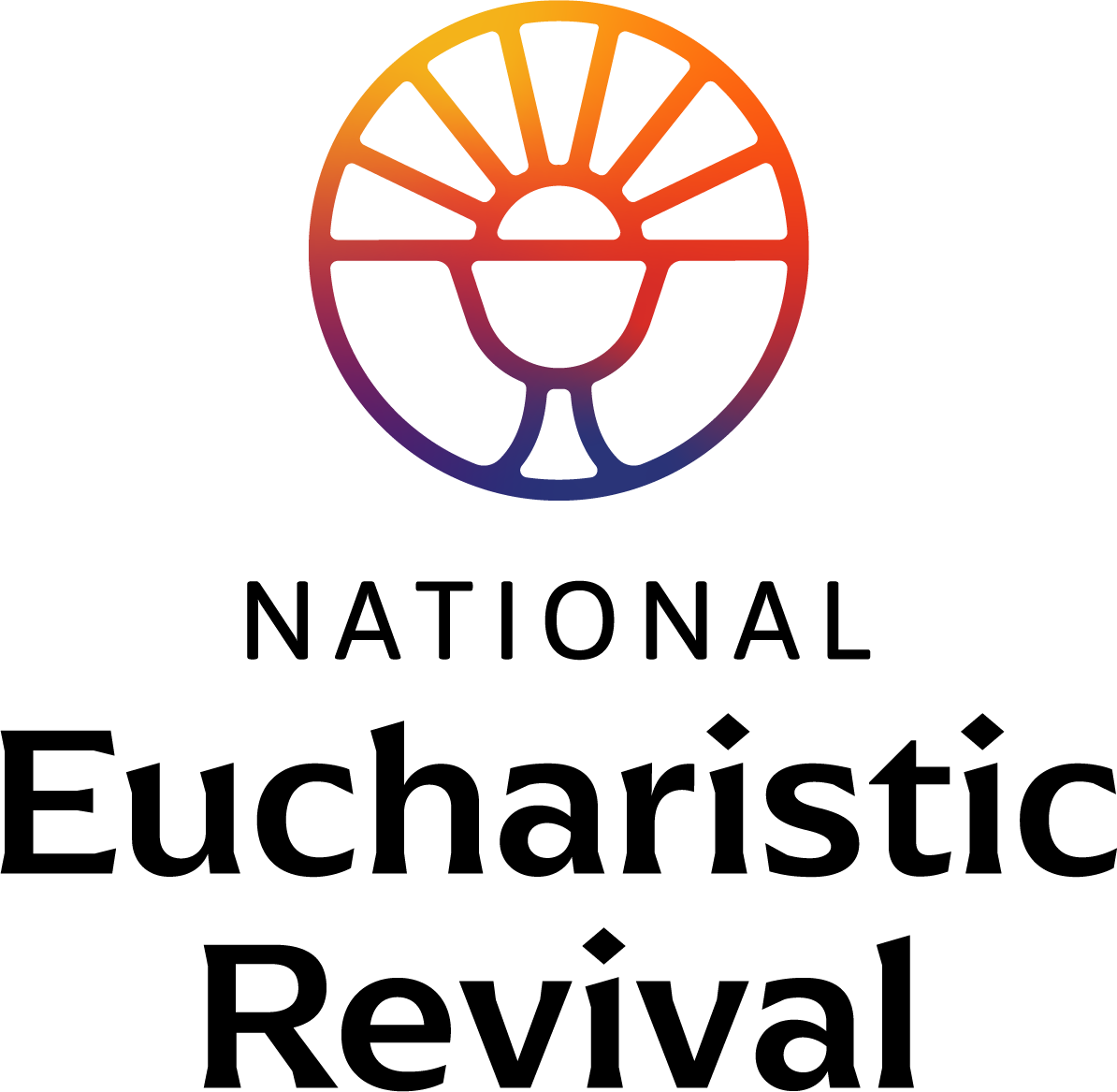Full Synod Report
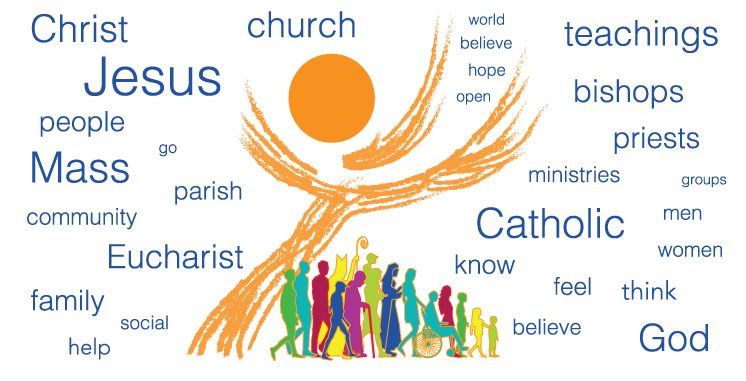
Table of Contents
Team
Joys
Challenges
Process
Reaching Out to Marginalized
Meaningful Moments
Connection/Disconnection/Desire for unity
Welcoming Hospitality
Inclusion/Exclusion/Marginalization
Eucharist
Liturgy
Catechesis
Mission Renewal
New Pathways
Eucharistic Revival
Discerning ongoing synodal structures
Serving Many Cultures
Emphasis on listening
Acknowledgements
Archbishop Hartmayer and the Archdiocesan Synod Team are deeply thankful to all those who participated in the diocesan phase for the Synod on Synodality. We would like to recognize the efforts of the Archdiocesan Outreach Synod Team members; our Deacon and Lay regional session facilitators; all of the organizations and parishes that hosted listening sessions and those that synthesized feedback for their local report. Furthermore, we appreciate every person who entrusted us with their hopes, dreams, hurts and frustrations by either attending a listening session or responding to the Synod survey. There are many important and specific comments that could not be included in this 10 page document, but please know that we have read and valued every response. The quotes in this document are taken from the surveys, local session reports and regional session reports. Names are withheld to preserve privacy.
Introduction and Context
Team
When the Vatican sent dioceses the invitation to participate in the Synod on Synodality last fall, Archbishop Gregory J. Hartmayer, OFM Conv., lost no time in building a team and encouraging the members to get to work quickly to take advantage of the short time allotted for the process. What the team has come to understand is that this Synod was just the beginning of an opportunity to reframe the way the Church can work with the Holy Spirit for the glory of God.
The Synod team in the Archdiocese of Atlanta had two components, a core team of employees and an outreach team invited from the diverse communities within the archdiocese. From the outset, the team made an effort to sink into a way of proceeding led by prayerful discernment. In addition to using the Adsumus Sancte Spiritus prayer, the team took pains to make decisions slowly and with input from each team member.
Joys
It is hard to limit the list of joys during the diocesan phase of consultation. The most significant was the realization that the Holy Spirit was truly present and guiding our consultation. So many people involved, from core team members to participants, spoke of how they could feel the presence of the Holy Spirit throughout the process, but especially during the listening sessions.
Structured moments of silent prayer seemed to open the hearts of participants. Attendees brought their individual hurts, anger, joys and hopes. Those who attended showed a willingness to share what they were feeling within the context of the fundamental question. The process helped focus the energy of those in attendance and helped the core team listen with love and respect. “Listening is the best part of the process; sharing without any reservations, fears or any kind of uncomfortable (feeling).”
The skepticism many participants expressed as they entered sessions seemed to transform to hope by the end of listening sessions. The core team noted that many attendees left listening sessions visibly uplifted, with a feeling that we are in this together. “The best part of this process is how all attendees felt that we are ‘all family’ and we journey together in our faith.”
Furthermore, as sessions progressed, the team began to notice common themes emerge. Attendees marveled at how many similar words and feelings arose in large group sharing. The regional session themes were found in local listening sessions as well, with a little more focus on interparish or community dynamics.
The timing of the synod was perfect for many who felt isolated and worried about their community members. Attendees expressed gratitude and joy for the ability to just gather after so much time separated because of COVID. “Covid separated the church family but we are learning that members want to come together.”
The sessions offered members of the same parishes who came from different cultural backgrounds a chance to share their hopes and dreams together. More than two-thirds of regional sessions featured people who spoke another language. One attendee noted that although the people at her session went to the same parish, the language barrier led to a lack of interaction. “We are fractured in a way. We have different groups depending on Mass times (sic) – a Hispanic Mass. Need more opportunities to interact together (besides Parish festival). Perhaps socials just to meet and share with one another (Anglo & Hispanic).” Others expressed a desire to have more cross-cultural gatherings in the future.
A related theme that crossed all cultural lines was a joy surrounding the return of Atlanta’s Eucharistic Congress after a two-year COVID hiatus. This joy affirmed Archbishop Hartmayer’s decision to relaunch the event and demonstrated a great love for the Eucharist in the archdiocese.
The archbishop’s ardent support of the synod was another high point in this process. The archbishop attended 12 of the 15 regional sessions, listening intently to those who spoke. He empowered the synod team to pursue every avenue possible to make the synod successful. During one session, he hand-wrote a prayer that he offered at all other sessions (video link in appendix iv). The synod team spoke repeatedly about how much each member learned from and loved the synod process. It helped build relationships between team members and between the team and parish representatives. The process of listening exposed some gaps in chancery services and parish expectations. Open discussions helped the chancery members of the synod team take immediate action to support the parishes.
The more sessions the synod team hosted, the more parishes were willing to host local sessions. At first, the synod team thought parishes would host local sessions and those would funnel into larger regional sessions. In some cases, parish representatives who were unsure of how to host a listening session became comfortable with the idea by attending a regional session. News about the sessions encouraged individuals to reach out by phone and email to the synod team to ask questions about the synod process itself or how to find a session.
Challenges
The limited time allotted for this process presented a real challenge to being synodal, which takes time, as well as direct invitation to those who need to be invited to participate. Added to that was the launch of concurrent initiatives such as the Eucharistic Revival and planning for the Archdiocese of Atlanta’s 25th Eucharistic Congress. Some priests struggled with the demands of what some called ‘yet another initiative’ from the Vatican and USCCB.
Another hurdle in the process was how to help people understand the concept of synodality itself. Not many people had ever even heard of a synod and many, including some invited to lead the synodal process, were skeptical that this process would have any impact on how the church operates. “Journeying together is hyperbole to me.” Several participants lacked confidence of any outcome. There was some tension about where change should originate. Some lay people felt like church hierarchy should initiate changes while others looked to their parish priest and still others felt that the laity should have more say in church governance and doctrine. From the opposite side of the spectrum, people expressed concern that the goal of the synod was to improperly change church doctrine by common acclamation.
Attendance became a regular difficulty. As the local and regional sessions continued, parishes reported that the few who participated were the most-active parishioners. Efforts to reach the marginalized, especially those who left the church, were not as successful as hoped. Some people reflected that they felt unsure about how to even invite participation from some marginalized groups, especially those who have left the church. “The most challenging aspect of the consultation process was engaging marginalized groups, youth, and groups of Catholics who have left or are close to leaving. We learned that asking for 2+ hours of time and trust from people who are deeply questioning or distrustful of the church is a barrier to securing their participation.” Accommodating schedules as well as the comfort level of people who still felt vulnerable to the pandemic presented obstacles. The team continued to reach into the ecumenical and service communities seeking voices from these communities.
A locally-specific concern came from those familiar with a pastoral plan published by the Archdiocese of Atlanta in 2015. A large portion of people feel the plan was unsuccessful due to lack of implementation. Many of these people saw the synod as another initiative with no power or momentum behind it.
Process
The consultation phase consisted of inviting and encouraging parishes, schools, ministries and groups to host local listening sessions; hosting regional listening sessions, a survey and a pre-synodal meeting. The core team created resources including a parish guide with two options for a prayer-centered listening session, a facilitator’s guide, as well as virtual training for would-be facilitators, downloadable posters and graphics for parishes to use locally and the online survey. One parish requested a printable survey while another asked that the survey be included in The Georgia Bulletin, the newspaper for the archdiocese. These additions allowed people who either did not have access to the internet or who were not as computer savvy to participate. Both options led to additional participation, including prison inmates.
The Office of Evangelization and Discipleship helped the core team create prayer-centered approaches to listening. During the listening sessions, the facilitators asked people to spend time in silent prayer—not what many expected from a so-called “listening session,” but a necessary step to inviting the Holy Spirit. People took these few minutes of prayer to heart. One facilitator commented, “you could hear a pin drop.”
The suggested listening sessions used the fundamental question as well as some of the supporting questions from the Vademecum to focus dialogue and input. The guides included suggestions for taking notes and for submitting those notes to the archdiocese.
The local phase ended with a pre-synodal meeting on May 9 at the Cathedral of Christ the King. Thirty-seven people joined the archbishop for Mass, a final discussion of the major themes from the process and a meal. The resulting recommendations of next steps fall under Mission Renewal and New Pathways.
Reaching out to the Marginalized
The 35-member outreach team was intended to be a primary means to solicit input from people on the margins. Members represented such groups as Catholic Charities, leaders from Vietnamese, Hispanic and Black communities, college campus ministers, a support organization for those who identify as LGBTQ+ and their families and the victim assistance coordinator for the archdiocese. These members acted as ambassadors of the synod in their communities, inviting people to participate. Members of the core team were careful and deliberate about inviting as many groups as possible. The outreach team met three times, but each outreach member had a core team member to whom they could go for support.
The archdiocese created a website where parish and group leaders as well as individuals could download a variety of resources from minute-by-minute guides for suggested prayer-centered listening sessions to videos on synodality itself. Resources were posted in Burmese, Chinese, English, Hatian Creole, Korean, Portuguese, Spanish and Vietnamese. The website included an invitation for any community not represented to contact the synod team for support. Soon after, the leader for disabilities ministry in the archdiocese saw a need for an adapted session for those with mental or physical disability or delay. She created the session and a second one for those with memory impairment. The core team continued to discuss how to be open to different kinds of listening. As a result, the consultation phase evolved as the team received input from throughout the archdiocese.
The regional sessions were open to anyone. The team asked parishes, schools, campus ministries, and groups to send two representatives each, leaving 60-100 seats open to the general public. Disappointingly, these extra seats were not often used. The team tried several tactics to increase attendance to no avail. Despite these challenges, the Holy Spirit provided diverse, needed and surprising voices at these regional sessions.
Some people who feel hurt by the church, for example, the divorced, abuse survivors and members of minority communities, did not wish to attend either local or regional sessions. Some of them submitted survey responses. Others are still missing from the process. One successful method was to structure small listening sessions for those specific groups with someone they trust. The Victim Assistance Coordinator personally invited abuse survivors to a session; the head of the Office of Black Catholic Ministry hosted a session for Black Catholic young adults; the director of the disabilities ministry hosted sessions for people with disabilities and their families. These sessions had few attendees, but their input was critical to lay a groundwork for listening in the future. The team would like to continue to pursue opportunities to listen to these communities after the formal synodal process is complete.
Meaningful Moments
An example of the impact of synodality and listening came early on when the core team presented proposed guides to the outreach team. The Archdiocese of Atlanta typically produces public material in English and Spanish. For the synod, the team decided to add Vietnamese to represent the third-most common language. The original plan was to launch the documents in English and add the other languages when translations were complete. An outreach team member challenged this idea. He said marginalized communities often felt “second class” or “like an afterthought” when resources for them were offered later. He also pointed out that there were several other cultural communities who, while not as numerous, deserved a voice in this process. These eye-opening comments shifted the rollout. The team unanimously decided to have all documents translated into seven languages and hold the launch until all could be posted.
The archdiocesan core team witnessed several valuable moments of encounter at regional sessions. At one session, a core team member noticed a woman sitting alone in the back. When she approached the woman to invite her to a table, she discovered the woman spoke only Spanish. The team was trying to figure out how to include her when a bilingual parish volunteer stepped forward, offering to act as an interpreter. After the session started, a group of young people from a Vietnamese parish arrived. One of the young people sat at the same table, adding another language and cultural perspective. At the end of that meeting, one woman at the table expressed that what appeared as an obstacle at the start of the meeting turned into a blessed opportunity of encounter for everyone gathered. She credited the Holy Spirit with bringing those particular participants together.
At another session, one attendee expressed open frustration about COVID restrictions when the archbishop made a lighthearted comment. To the team it indicated a need to address the hurt and loss many felt because of the closures due to the pandemic. It appears that restrictions on gatherings heavily impacted the rural communities throughout the archdiocese that represent 71 percent of the Archdiocesan geography and only 21 percent of the total population. What might have been dismissed as one angry comment became a deeper discussion among the team. “COVID has been a recent low point for the community since it kept us away from fellow parishioners and from receiving the Eucharist.” The survey also bore out this theme. “The pandemic has jaded parishioners. The Church not only closed their doors on them, they lost touch with them. Only volunteer leaders kept ministry work and outreach going online. They feel abandoned.”
An additional example of listening that created further opportunities of dialogue among the core team and beyond involved liturgical preferences. Given the recent changes related to pre-Vatican II liturgies, the core team expected some forceful comments. While these were present at times, those with a love for the older Latin liturgy also offered their heartfelt participation in the whole process, carefully reflecting on all of the questions. They presented their love for the liturgy and their church in a way that opened an opportunity for dialogue.

Themes for Discernment
People who attended local listening sessions reported great joy and value in the gatherings. One joy of this process was the fruit of small-group gatherings. Almost 100 people specifically commented on this. Half cited the listening as a high point of the synod while the other half expressed delight at the opportunity to be physically present as a group. As synod team leader Jennifer Miles reflected, “the Holy Spirit sent who we needed.” As sessions continued, a series of common themes emerged. All were mentioned in both positive and negative connotations and were supported by the local listening reports and survey responses. The team highlighted two additional themes after all consultation was in and based on the pre-synodal gathering.
Connection/Disconnection/Desire for unity
The most common concern mentioned was a sense of connectedness or disconnectedness to the church, parish or archdiocese. People want to feel personally connected. They are troubled and even devastated if they feel disconnected and they worry about their neighbors who have left the church. Two survey respondents spoke about this in response to the question of their hope for the church. “That as Church, we would be able to provide healing to those whom we have hurt, offended, and pushed away, and that we would be able to break the (ethnic/cultural, language, racial) barriers that separate us and form lasting bonds of love as brothers and sisters (and not only with those within the Church, but especially those living outside the Church).” “My hope is that we will be a welcoming community for those who have left the church during the pandemic as well as those who struggle to believe in the Eucharist and the value of a faith community. I pray that the Magisterium will provide direction and teaching for those of us who are struggling with how to counsel and support the transexual, homosexual, [as well as] pro-abortion, mis-informed individuals without diluting or weakening the tenets of our faith.”
One sign of hope is that people recognize, “Jesus is the source of our unity.”
In reference to both parish life and listening sessions, people cited how well a small-group dynamic works to build relationships and strengthen parish life.
It may seem like disconnection would just be the flip side of the need for connection, but the discussions about the cause for feeling disconnected revealed additional issues of concern.
The inability to appreciate cultural or language differences and a lack of intercultural competency are causing division in many parishes today. People want to be united as a church, but are not sure how to accomplish that when their fellow parishioners want to attend a Mass that reflects their cultural heritage.
The Archdiocese of Atlanta is incredibly diverse. Based on 2020 data, our estimated Catholic population is majority non-white. The Hispanic population and non-Hispanic white population are estimated at 43 percent each. Furthermore, Masses are celebrated in at least 12 different languages. The largest local listening sessions held were at San Felipe de Jesus, a parish with a blend of Haitian and Hispanic members. Three thousand people participated over two days.
It is significant to note that an overwhelming majority of survey responses from people born since 2000 came from Hispanic persons, especially from Our Lady of the Americas.
Another subtheme of disconnection came from people who experienced conflict with their pastor or parish staff. They take very personal offense to their interpretation that the pastor does not respect or dislikes them. “Overbearing priests who feel more special than they are. After 30 years of being a very active Catholic, I have recently left. The structure of the church with the priests in total control has been a big part of my leaving.” “New staff has no connection to those of us who are long time parishioners.”
Conflict within a parish can be so upsetting that people feel driven away from their church. “The desire for unity seems to correlate with the desire for traditional exercise of the faith. Unity often seemed directed at unity of thought and teaching.”
The synod team discovered that many people feel a sense that they are not connected to their archdiocese or any parish other than their own. This was especially true in rural parishes. Some commenters reflected that closures due to the pandemic increased their sense of feeling abandoned by the archdiocesan church. “Internally, there is a lack of trust in the leadership of the Church above the level of Parish Priest. Some parishioners believe that programs from the Archdiocese and above are tone deaf and do not relate to the needs of most parishioners.” “ There needs to be a better effort at including rural parishes in events and providing Archdiocesan activities that are closer to their location.” “As we have a new Archbishop, we have a unique opportunity to have fresh eyes on our archdiocese and make some needed changes…and allow more attention to be on parishes that may be suffering or need more love and growth right now. As a minority filled parish, we want our efforts highlighted at the same rate as other parishes and to have the same opportunities as larger parishes.” “There is no connection with the archdiocese except for the taped “ask for money” speech. Would like more interaction with the archdiocese (catechesis, events, visibility on use of funds throughout the year).”
The Universal Church as a home for all and should be a place people want to return to.”
Welcoming Hospitality
Almost as if to be a counterpoint to the connection/disconnection debate, many reports referenced people’s thoughts on the need for the church—especially the parish—to be welcoming.
Sentiments included the desire that this welcome be genuine and ongoing and related to the celebration of sacraments. “I hope that more people will feel welcome. I hope that more people will experience the intimacy of Christ in the Eucharist. I also hope that many non-Catholics will feel welcome and respected.”
“Many hearts have been broken by past actions of the Church. It can be difficult to walk with others who do not feel welcomed.”
“Our churches need to be a place where people feel part of a connected family.”
“The Universal Church as a home for all and should be a place people want to return to.”
Survey Respondents by Decade of Birth
Inclusion/Exclusion/Marginalization
Many of the people who do not feel welcomed come from marginalized communities. These include Black and Hispanic Catholics; people with disabilities; people who identify as LGBTQ+ and/or their families and friends , and people who would prefer a more traditional liturgy, devotional life and community. Some sentiments included the perception that the church has not journeyed well with people who identify as LGBTQ+, women and people with disabilities.
“The Archdiocese does not need to look outside of itself to hear the Holy Spirit calling from the margins; the Archdiocese must look intently at the way it has marginalized its own communities, whether through active discrimination or passive inaction.”
“Whether it is in the form of unhospitable ministers/staff or a failure of clergy to acknowledge the scourge of contemporary and historic patterns of racism in the Church and society, there is a common experience of isolation when one is not in a predominately Black Catholic context. This experience is also shared by family members, including some who are no longer affiliated with the Catholic Church yet continue to monitor developments in the Church.”
“We need more space in parish for Hispanic adults. We have the desire to be involved but not resources.”
“There is a tremendous need for support for those living with disabilities. We need to find more creative ways to include so people can get to know each other and not isolate. Isolation is painful. All those attending the session long for relationships – not just people who tolerate them. Music is an international language and can be felt by most. We should find ways to include persons with disabilities in parish musical opportunities.”
“The question of who is marginalized creates division. The poor, the homeless, the sick are widely accepted. When the definition extends to the LGBTQ community, there is disagreement.” “Several commenters sought outreach to youth and those who left the Church. There were comments seeking greater outreach to disenfranchised, such as LBGTQ, women, or racial minorities. There were few seeking outreach to society in general.” “Participants seemed to struggle to identify who the marginalized are, even before considering how to welcome them best.”
Eucharist
The Eucharist played a prominent role in many discussions during the synodal process. Several listening session attendees referenced the story of Jesus revealing himself to his disciples at Emmaus as a good allegory for the synodal journey, noting that Christ came to meet the disciples on the road. One commentor observed that we should adapt on our journey to accommodate our slowest travel companions as Jesus adapted his message to help the disciples understand their salvation. Other commentors added that “we must develop some sort of friendship with those journeying together. Christ reveals the Word to them, feeds them himself (Eucharist), and gives us strength to fulfill the mission always together in collaboration.”
Other Eucharist references revealed a common fear that people will not return to the Eucharist post-COVID.
A final point in need of further discernment and discussion were multiple comments from people who say the Eucharist is the only reason they still come to church. Comments such as these merit investigation into why these people are unhappy and how the church can better minister to them so they can enjoy the full benefits of Catholic life. “If it were not in my firm and faithful belief in the Real Presence, I would have already left the Catholic Church. But that will never happen.” “Have not left, but disappointed.” “I will never leave the Catholic Church. The people in the Church might hurt people, but my faith is in Christ, He sees it all and He will never leave his bride, the Church, neither will I.” “My faith is waning these days as the times are so depressing and it makes me feel very isolated.” “I’ve not left the church so to speak, I just don’t go to Mass since I cannot receive the Eucharist since I am a divorced and remarried Catholic.” “I didn’t leave the church, the church left me. (… when I was divorced then remarried, to a divorced Catholic).” This response was repeated. “I cannot leave the Catholic Church because of the Eucharist, but sometimes I really want to.” “At some point I wanted to leave because of the church scandal with minors, but the sacraments made me come back. I realized the priests are just like me and need much prayer.”
Liturgy
Similarly, the perception of the quality of liturgy in a parish impacted how commentors felt about the future of the church. Some people made positive comments, saying they saw liturgy as a way to encounter Jesus. Others cited “boring” homilies as a reason young people might not attend.
As noted earlier, the core team received some comments from people who desire a more traditional liturgy. Some wanted more Latin while others want the pre-Vatican II Mass to be a regular option or at least a point of discussion. One report reviewer pointed out, “While a number of comments related to the traditional Latin Mass (TLM), there was little concern about the availability of TLM. Rather, there was concern that those desiring to attend TLM were not respected.”
Even among those who support the Ordinary Form of the Mass, there were comments such as “There has been a loss of the sense of the Sacred in Mass. The pandemic has people away and watching on TV. (sic) Need to get back to in person attendance.”
Catechesis
People in the archdiocese expressed worry about catechesis. Most feel the current offerings are lacking, particularly where young adults are concerned. A few wish to return to the Baltimore Catechism model and still others see family faith formation as the most effective solution. Still others brought up the importance of including Catholic Social Teaching. Cultural communities also worry that catechesis is not strong for those for whom English is a second language. A deeper question not always clear in the comments is the meaning of catechesis and how Catholics understand catechesis generally (e.g., handing on accurate content and instruction versus a broader understanding of catechesis as discipleship formation with a constant evangelizing impulse). “There are no resources or training to share the Gospel. We don’t know how to ‘preach in the streets’ or go on mission in our community.”
The debate about good catechesis led one reviewer to reflect on what he saw as the end goal of good catechesis. “Intellectually, these comments point to the need for further adult formation in the faith that empowers Catholics to make distinctions between essential matters of faith which require unity and matters of practice where culture, conscience, and temperament may lead to differences which ought to be valued rather than limited through an imposition of ‘rules.’ Spiritually, these comments call for further opportunities in the Church for adult Catholics to develop their faith from being rooted in legalism to being rooted in mercy and charity. This is not solely a matter of catechesis as basic religious instruction, but of theological and spiritual formation which invites adult Catholics into a more mature understanding of the faith.”
“As a Catholic with a strong belief in the Eucharist, nothing, “sic” as nothing else can offer what the Catholic Church does in intimacy with God. However, many who do not have the same belief can be swayed, as their foundation is not strong. We don’t do a great job at teaching heart knowledge, instead siding with book knowledge (especially prevalent in RCIA programs for children). People will go out seeking for more if they don’t realize they have it all, and the burden of encouraging experiences with the Eucharist to form heart knowledge rests on us as the Church.”
Mission Renewal
A common concern for many was how to get people back to church. “There is a need on the part of the entire Church to reach out to those who are no longer or infrequent participants in the community.” Reasons for leaving included people who are divorced, people who never returned when churches reopened after COVID restrictions, abuse survivors and people who disagree with church teachings and doctrine on social issues such as immigration, sexual identity, abortion and more. People cited too much and too little involvement in politics as other reasons people have left.
In many cases, the report mentioned that parishioners were not sure how to even connect to the marginalized, much less invite them to participate. “People are not feeling good about themselves, and we need to find a way to reach out and love those around us.” This showed up when people reflected on who attended local listening sessions. “It was difficult to find participants who were not among our most active members—to hear voices from the marginally affiliated.”
A core team member offered thoughts on how to address these concerns. “Everyone longs to be loved and accepted—to be part of a family. That desire is present throughout the synod responses, though it’s not always clear that Catholics fully know how much they are loved by God the Father in Jesus Christ and through the Holy Spirit. Everyone has different hurts and places in need of healing. The kerygma is the most important story that makes sense of our individual and communal stories. It reveals how much we are beloved by God, and it is inseparable from the Eucharist—the two go hand in hand.”
There was lots of agreement on the need to boldly declare the gospel. There was some disagreement on who is responsible for this work. Survey respondents felt it is the clergy or hierarchy’s responsibility to fix issues. In the survey, some respondents suggested changes they would like to see in their church. The suggestions primarily centered on changes made at the parish level (50 percent). Thirty-three percent at the archdiocese or universal church. Only seven percent focused on actions of individual Catholics.
This contrasted with the outcomes of listening sessions that encourage the role of the laity: “Helping parishioners realize that they too are co-responsible for sharing the Gospel will be key for the next few years as our parish tries to operate post COVID.” One major recommendation from pre-synod meeting included giving priests more time for pastoral issues.
New Pathways
It would appear that synodality is so appealing that many participants want more. More than a third of the participating communities have concrete plans to continue synodal dialogue within their parish or ministry. Two dozen are still considering next steps, ranging from “we don’t know” to plans to review feedback with leadership and share results with the community.
An outreach team member reflected on possible ways forward. “While some parishes have more stable ways of addressing Inquiry for RCIA, utilize community councils regularly, and may use various programs/initiatives to invite an evangelizing space in the parish, a more intentional and long-term approach to encourage listening and sharing as a key mission-component of every parish could be fruitful. Many of the divergences shared in survey responses are not going away soon, and the art of accompaniment requires intentional time and space given to listening to others. Such listening is also crucial for encountering others, building relationships, and addressing areas in need of healing—all fundamental to the mission and ministry of evangelization … a possibility to explore: Charism/Ministry of Listening: Explore the possibility of taking next steps to institute Christus Vivit’s vision re: accompaniment and listening in parishes and elsewhere: ‘The charism of listening that the Holy Spirit calls forth within the communities might also receive institutional recognition as a form of ecclesial service’ (CV, no. 244).”
These reports demonstrated an important understanding on the part of participants: they are not looking for concrete results or changes from the archdiocese, but a ministry of presence that affirms their desire to participate.
Another suggestion was better communication between communities within parishes, who often operate parallel to one another instead of together, as well as improved communication between separate parishes within the archdiocese to promote unity.
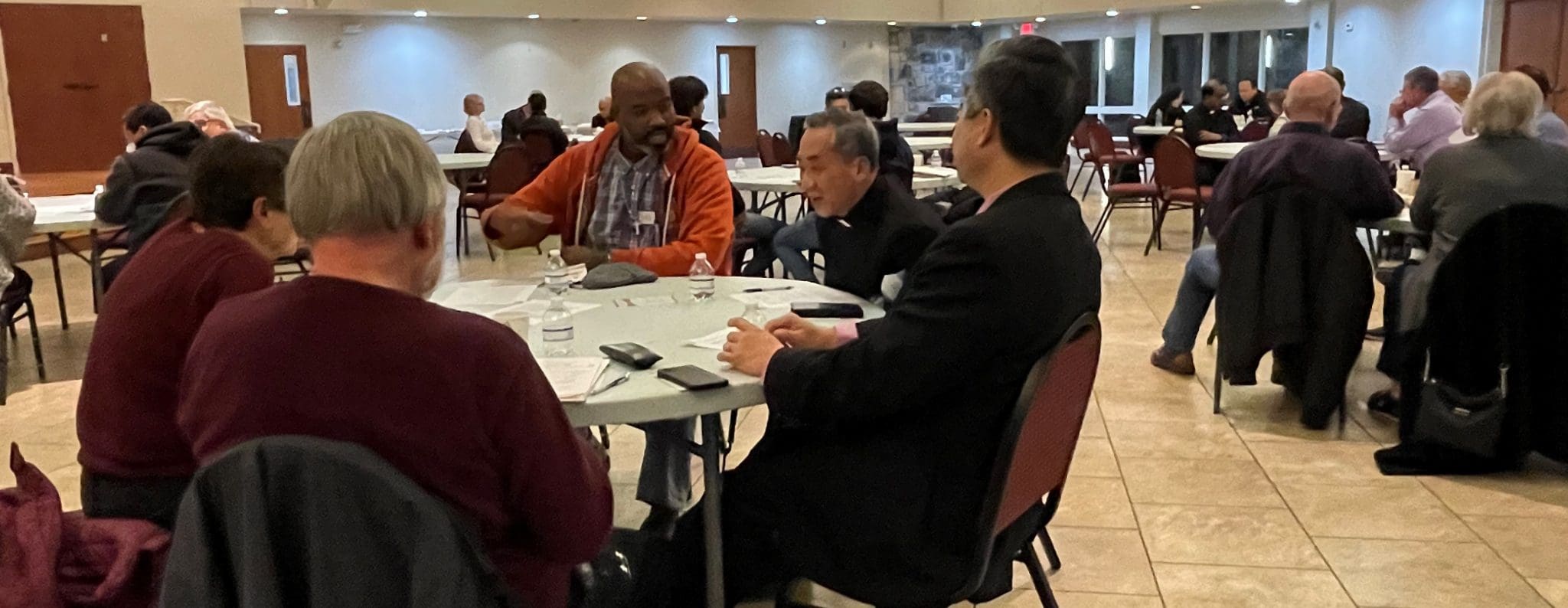
Conclusions and next steps
The synod team in the Archdiocese of Atlanta continues to discern what shape the next steps should be, but several items appear to be calls from the Holy Spirit for immediate action.
Eucharistic Revival
The Eucharistic Revival has come at a graced moment. Many members of the synod core team are on the team tasked with guiding the revival here in the archdiocese. These team members feel strongly that this effort can and should be synodal. This team heard how much people desire to both receive and better understand the Eucharist. There are ongoing opportunities to invite people to speak more specifically about their dreams and desires for this revival and for their church. Atlanta is blessed to have a 25-year tradition of a Eucharistic Congress. The revival was launched at this year’s event. Archbishop Hartmayer commissioned parish-based Eucharistic Revival Missionaries at the closing Mass. These missionaries will be key to the synodal aspect of the revival.
Discerning ongoing synodal structures
In addition to the revival, the team hopes to continue discernment about how to help establish and support synodal structures throughout the archdiocese. Some suggestions include helping connect lay parish staff members within the deanery structure, offering suggestions and best practices for synodal bodies such as pastoral councils, and continuing some kind of listening sessions as an ongoing practice. Archbishop Hartmayer expressed a desire to hear from parishes how they think they can best continue to support synodality. On the archdiocesan level, the synod team will continue to meet and discern what steps are appropriate outside of or complementary to the Eucharistic Revival efforts.
The team may even embrace or modify a project used in the Diocese of Davenport that invited Catholics to have coffee and synodal conversations with individuals with an emphasis on the marginalized. Small group dynamics appeared to be the best way to invite marginalized people to come forward during the consultation phase so this effort might be a great way to add voices, little by little, to the conversation.
Serving Many Cultures
Discernment about the demographics reflected in the survey may also be fruitful. The overwhelming numbers of Hispanic young people who participated indicates a place where the church is thriving. The demographics at this year’s Eucharistic Congress reflected a similar reality. The Spanish-language track was standing-room only while the English track drew smaller numbers than in years past. This calls for an examination of how to support both communities, to learn from and strengthen one and to support and draw back into practice the other.
Emphasis on listening
One of the key questions to answer is, what does listening look like in a concrete, long-term way? What does it look like in terms of structures? How can the archdiocese collaborate with parishes to do this – not in a way that dictates a specific, rigid way of proceeding, but in a way that continues to ask how do we walk this journey together?
Listening is essential to the church’s mission of evangelization. There is a tension within so many of the painful issues mentioned in these sessions – people who feel marginalized because of their style of devotion, their experiences, understandings and expressions related to sexuality and sexual identity, their language or cultural background or even political beliefs. People who still feel angry or hurt by the loss of community due to COVID isolation. People who feel hurt and angry about racism and injustice. The list goes on. These tensions are not easily resolved and it takes practice, discernment and a real openness to the Holy Spirit to continue to accompany one another along the path to heaven.
Listening is key to helping determine what task is appropriate for each person. While many feel the bishops and priests don’t do enough to ‘fix’ what they see as problems in the church, others feel lay people should have more control over the direction of the church. It is only though listening and discernment that the community can determine what each person can and should do to strengthen the Church on the parish, archdiocesan and global level.
